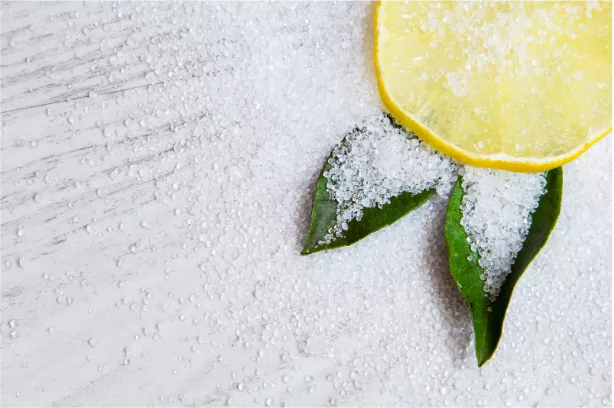Is Citric Acid Bad for You?
You see citric acid everywhere – in citrus fruits, sodas, beauty products, medications. It’s so common that many people wonder – is citric acid good for you? or bad? It comes from natural fruits, but companies also synthetically make a lot of it for all kinds of industries. But should we worry what citric acid might do to our health? Let’s find out what exactly this acid is, what it’s used for, and if it can affect the human body. The goal is to figure out once and for all: is citric acid bad for you?

Citric Acid Overview
Citric acid is a weak kind of organic acid represented by the formula C6H8O7. Naturally, you’ll find this acid in citrusy fruits – lemons, limes, oranges. But companies also synthetically produce citric acid using the fungus Aspergillus niger. This fermentation method was discovered back in 1917 and now it’s the main way companies mass produce citric acid.
Some people question – do apples contain citric acid? While many fruits and veggies have citric acid, apples aren’t one of them. Apples contain high levels of malic acid, which gives them their sour punch. So while citric acid turns up almost everywhere, it’s not found naturally in apples.
Citric Acid in Food Industry
Citric acid plays a huge role in food manufacturing as a preservative and flavor booster. You’ll find it added to many foods and drinks to make them last longer on shelves, control acidity, and give them a nice tart kick. Lots of processed foods, like canned produce, jams, sodas rely on citric acid as a key ingredient.
One of main uses of citric acid in food is as a preservative. Its acidic properties slow spoilage by blocking mold and bacteria growth which helps products stay fresh longer. Citric acid also controls pH, so foods maintain the right acidity levels. This matters big time in cheese making, where citric acid regulates fermentation.
On top of preserving foods, citric acid enhances flavor. It gives foods and drinks a pleasing sour, tangy taste. That’s why you see citric acid added to lemonades, fruit juices, sodas – it makes them more refreshing. The acid is also used in candies, baked goods, and dairy items.
Some people have started adding citric acid to drinking water lately. They believe it aids in digestion, immunity, and health. But more research is needed to know if this really works or is safe. So talk to your doctor before significantly changing your diet.
Citric Acid Health Effects
So, is citric acid healthy? Generally yes, when we’re taking moderate amounts. This acid plays a key role in energy metabolism and can help your body absorb important minerals like calcium and magnesium more efficiently. There’s also some evidence citric acid may help prevent kidney stones from forming by changing urine content.
Still, some potential concerns about the citric acid effects on the body do pop up, especially if you consume way too much. For example, some people wonder whether too much citric acid might set off acid reflux or other digestive troubles. High acid levels can increase symptoms for people with sensitive stomachs or pre-existing issues like GERD.
If we look at the citric acid nutritional information, it doesn’t contain many nutrients on its own. Sure, it’s an organic acid which is a part of the Krebs cycle, but it’s not considered an essential vitamin or mineral. The real benefits of citric acid have more to do with helping your body absorb other nutrients better and protecting it against certain health problems.

Potential Health Concerns
Is citric acid harmful? Some people also worry – can citric acid cause acid reflux, or make acid reflux worse?
Researches show that eating too much citrus fruits and juices with high citric acid might raise the risk of acid reflux issues. This is because the citric acid can stimulate the stomach to make more acid. It can also relax the muscles between the stomach and esophagus. This causes stomach acid to flow upwards.
Some argue citric acid causes tooth enamel erosion, stomach upset, and allergic reactions. But these problems seem more likely to occur only with overdoing citric acid or in people with existing sensitivities. People with no previous stomach issues are generally okay with using citric acid in moderate amounts. Foods very high in citric acid, like lemons and limes, might be troublesome for those with prior digestive conditions.
Allergies and Sensitivities
In uncommon cases, citric acid could potentially trigger allergic reactions or sensitivities for some people. What are some possible symptoms of citric acid sensitivity? Issues like digestive trouble, joint aches, skin irritation, and respiratory issues may come up. However, these kinds of responses are highly common.
Most people seem to safely handle normal dietary citric acid amounts. If you think you may have a citric acid allergy or intolerance, consulting a healthcare professional for proper diagnosis and management is best.
Citric Acid Safety
Citric acid is generally recognized as safe (GRAS) for use in consumer goods. Reviews of scientific data show citric acid is safe when appropriately used.
Citric Acid as a Vitamin or Nutrient
Is citric acid a vitamin? No, citric acid is not a vitamin – though it’s often mistaken as one. It does play a key role in metabolism as part of the Krebs cycle.
It can improve how well the body absorbs certain minerals like calcium and magnesium.
For most people, normal citric acid amounts are safe. As with anything, it’s wise to use citric acid responsibly and know your tolerance levels.
Citric Acid Applications
Citric acid has many uses at home and in industry. It’s helpful to use citric acid for cleaning since it tackles stains, removes scale, and disinfects areas. Major uses of Citric acid powder are descaling appliances like coffee machines, kettles, and dishwashers by removing mineral buildup.
In non-food industries, citric acid uses in cosmetics as an exfoliant and pH balancer. It also preserves and enhances flavors in pharmaceuticals. As a chelating agent in water purification and metallurgy, citric acid helps take out impurities and prevent corrosion.
Some innovative citric acid uses include cross-linking proteins and polysaccharides in biotech, and treating kidney stones and metabolic acidosis in medicine.
Citric Acid Benefits
Used properly, citric acid has many benefits, like helping the body absorb minerals, preserving foods, and providing a tart taste.
Positive Effects on the Body
Enjoyed in moderation, citric acid can contribute to overall health. It has a role in the Krebs cycle, which is key for making energy in the body. Adding citric acid to drinking water can also boost digestion and improve nutrient absorption. Citric acid’s antioxidant abilities can additionally help combat oxidative stress and dial down inflammation.
Consumer Considerations
- Read labels closely to make informed choices about goods with citric acid. You’ll often see citric acid in foods, drinks, and household items ingredients.
- When using citric acid powder at home, carefully follow instructions.
- Citric acid as a preservative is typically considered harmless, but some folks may be sensitive.
- Check for citric acid or E330 ID to identify citric acid in drinks.
- Knowing citric acid acidity helps pick items that suit your tastes and diet. Some may favor drinks that don’t have citric acid if they are sensitive to its effects.

Identifying Citric Acid in Products
Want to know if a food or drink contains citric acid? Check the ingredients list! You’ll see “citric acid” or possibly “E330” which also means citric acid. Sometimes citric acid is called “sour salt” since it has an acidic taste.
When adding citric acid as a preservative for homemade goods, it’s key to realize it can make things more acidic. Extra acidity impacts flavor, stability, and shelf life. For instance, citric acid in homemade jams or pickles creates an acidic environment that stops bacteria growth.
For beverages, citric acid boosts tart, zingy flavors. Citric acid granules or powder get added to lemonade, iced tea, cocktails, etc. to balance out sweetness and complement other ingredients. But don’t overdo it – too much acidity ruins the taste and can damage tooth enamel over time.
By learning the different names and forms of citric acid (citric acid powder, citric acid granules, etc.), you can make better choices about products you buy or foods containing citric acid. Knowing citric acid’s role in preservation and flavor allows you to consume it moderately so foods and drinks have the right taste and acidity level.
Conclusion
In closing, citric acid is very versatile, with all kinds of uses that offer great benefits across many industries. While it’s generally seen as safe, going overboard or using it wrong could cause some health issues, so it’s important to be careful. When people understand citric acid’s properties, uses, and safety stuff, they can make better decisions about how to work it into their daily lives.
For those of you who want high-quality citric acid and other food additives, contact Mondstar – a trusted Chinese company that sources pure, quality food additives. With their expertise in supplying citric acid and other food additive and raw chemicals, Mondstar ensures manufacturers and consumers get the best food additives for whatever they need.
Related Posts:
1. Artificial sweetener Sodium Cyclamate
2. Sodium Benzoate Buying Guide—FAQs about buying Sodium Benzoate
